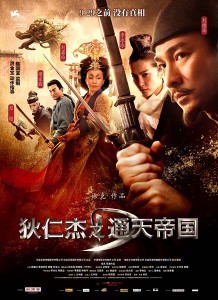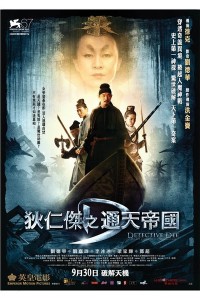Detective Dee and the Mystery of the Phantom Flame
狄仁杰之通天帝国
Hong Kong/China, 2010, colour, 2.35:1, 120 mins.
Director: Xu Ke 徐克 [Tsui Hark].
Rating: 7/10.
Entertaining but throwaway whodunit set in Ancient China recalls oldstyle Hong Kong action spectacles.
Luoyang, east central China, A.D. 689, early Tang dynasty. Wu Zetian (Liu Jialing), regent for the past seven years, is about to become the first empress of China, despite opposition from government officials and clansmen. As foreign dignitaries start to arrive for her coronation, a towering statue of a female Bodhisattva with her face is in its finishing stages in the centre of Luoyang, China’s second capital. During a guided tour of the statue for one foreign ambassador (Jean-Michel Casanova), construction chief Jia (Liu Jinshan) spontaneously combusts, seemingly because of “divine intervention” due to him removing some amulets from the statue’s central pillar. Initially, investigating officer Xue Yong (Liu Jinshan) and his  albino assistant Pei Donglai (Deng Chao) suspect the statue’s Uyghur architect, Shatuo (Liang Jiahui), previously jailed for treason, but soon afterwards Xue Yong also spontaneously combusts in the sunlight. Keen to solve the mystery before her coronation, Wu Zetian sends her loyal retainer and food-taster, Shangguan Jing’er (Li Bingbing), to track down former minister of state and polymath Di Renjie (Liu Dehua), jailed eight years ago for resisting her rise to power. Shangguan Jing’er rescues Di Renjie from an assassination attempt in the high-security prison and brings him back to Luoyang, where Wu Zetian, despite their differences, makes him an imperial commissioner to sove the case of the “Phantom Flame”, with Pei Donglai and Shangguan Jing’er as his assistants. After fending off an invitation from Li Xiao (Yao Lu), a general, to join him in usurping Wu Zetian, Di Renjie is reunited with his old friend Shatuo, who thinks a rare kind of beetle that feeds on phosphorus is responsible for the fiery deaths. Di Renjie, Shangguan Jing’er and Pei Donglai set off to the underground Phantom Bazaar to meet Donkey Wang (Richard Ng), who may be able to help in the investigation.
albino assistant Pei Donglai (Deng Chao) suspect the statue’s Uyghur architect, Shatuo (Liang Jiahui), previously jailed for treason, but soon afterwards Xue Yong also spontaneously combusts in the sunlight. Keen to solve the mystery before her coronation, Wu Zetian sends her loyal retainer and food-taster, Shangguan Jing’er (Li Bingbing), to track down former minister of state and polymath Di Renjie (Liu Dehua), jailed eight years ago for resisting her rise to power. Shangguan Jing’er rescues Di Renjie from an assassination attempt in the high-security prison and brings him back to Luoyang, where Wu Zetian, despite their differences, makes him an imperial commissioner to sove the case of the “Phantom Flame”, with Pei Donglai and Shangguan Jing’er as his assistants. After fending off an invitation from Li Xiao (Yao Lu), a general, to join him in usurping Wu Zetian, Di Renjie is reunited with his old friend Shatuo, who thinks a rare kind of beetle that feeds on phosphorus is responsible for the fiery deaths. Di Renjie, Shangguan Jing’er and Pei Donglai set off to the underground Phantom Bazaar to meet Donkey Wang (Richard Ng), who may be able to help in the investigation.
REVIEW
After almost a decade of bungled (Seven Swords 七剑, 2005; All About Women 女人不坏, 2008) or plain awful (Missing 深海寻人, 2008) movies, 60-year-old Hong Kong director Xu Ke 徐克 [Tsui Hark] finally rediscovers his earlier mojo with Detective Dee and the Mystery of the Phantom Flame 狄仁杰之通天帝国. The first in a mooted franchise based on real-life Tang dynasty judge Di Renjie 狄仁杰 – best known in the West through the novels of late Dutch author-diplomat-orientalist Robert van Gulik (published in English in the 1950s and 1960s) – Dee is lavishly mounted, generally well-cast but ultimately forgettable popcorn entertainment whose taste doesn’t linger long in the mouth afterwards. Agreeably less frantic than Xu’s hyper-kinetic Zu Warriors 蜀山传 (2001), and more in the style of his Once Upon a Time in China 黄飞鸿 trilogy (1991-93), with succulent production design, setpiece fights and a fascination with things mechanical, the movie starts with an impressive sense of breadth as the characters and setting are laid out but becomes choppier and less weighty in its second half, with a finale that’s both too long and lacking a climax dramatically worthy of the labyrinthine, two-hour plot.
In this respect, Dee looks a little old-fashioned when set against recent large-scale costume dramas from Greater China, especially the swordplay movie Reign of Assassins 剑雨 (2010), directed by Su Zhaobin 苏照彬 and Wu Yusen 吴宇森 [John Woo], with which it’s going head-to-head on release in China. Where Assassins sports a beautifully honed screenplay by Su and a sense of cultural depth that also enhances the drama, Dee is all on the surface, with no deeper resonances. In short, despite being shot in China with Mainland money and some actors (Li Bingbing 李冰冰, Deng Chao 邓超), it’s basically like a Hong Kong movie from the 1990s, full of Hong Kong names (Liu Dehua 刘德华 [Andy Lau], Liu Jialing 刘嘉玲 [Carina Lau], Liang Jiahui 梁家辉 [Tony Leung Ka-fai], Wu Yaohan 吴耀汉 [Richard Ng], Guan Weipeng 关维鹏 [Teddy Robin]) and with a Hong Kong, offshore aesthetic. Unlike other Hong Kong filmmakers moving over to the Mainland – such as Chen Kexin 陈可辛 [Peter Chan] with The Warlords 投名状 (2007) or Wu with Red Cliff 赤壁 (2008) – or even Taiwan’s Su, Xu basically remains wedded to a style of filmmaking that burned brightly two or three decades ago but now looks out of synch with present trends in the Greater China industry.
Despite that, the film fields an impressive key cast on top form. Recalling her dangerously sexy character in A World without Thieves 天下无贼 (2004), Li is especially good as tomboyish officer Shangguan Jing’er; and (Mainland-born) Liu Jialing is utterly believable as the ruthless empress-to-be, with killer eyes and equally killer hair-dos. Both Deng (Assembly 集结号, 2004) as an albino judicial officer and Hong Kong veteran Liang as the one-handed architect are characterful and good fits with their roles. The one notable casting weakness is in the title role. Liu Dehua’s Di Renjie doesn’t appear until 20 minutes into the picture, by which time all the other major characters are established, and he simply lacks the dramatic and intellectual heft to properly stand out amongst such a strong cast. No matter that Liu’s Di Renjie is unlike the portly, middle-aged character usually portrayed in Chinese TV dramas; his Di has the keen eyes of a polymath investigator but not the physical presence or intelligence to inspire respect. As a result, Dee is more of an ensemble movie than one which could really launch a franchise around a single character.
The screenplay by Taiwan’s Zhang Jialu 张家鲁 (The Matrimony 心中有鬼, 2006; Forever Enthralled 梅兰芳, 2008), an in-house writer at producer Huayi Brothers, lays out its plot and red herrings with some detail in the first half. And though it still seems a bit stretched at two hours, Xu and his team do keep things moving. The score by Jin Peida 金培达 [Peter Kam] – all braying horns, slicing strings and pounding percussion – matches the film’s impressive visual scope, and the costumes by Yu Jia’an 余家安 [Bruce Yu] and production design by Zhao Chongbang 赵崇邦 [James Choo] (especially for the capacious interior of the giant statue) are eye-filling, with Xu delighting in the pulleys, ropes and other gizmos. Action sequences staged by Hong Jinbao 洪金宝 [Sammo Hung] are OK but rather familiar. Visual effects start well but seem to get weaker and more washed-out in the second half, with the widescreen photography also showing some HD blur in action sequences.
CREDITS
Presented by Huayi Brothers Media (CN), Huayi Brothers International (HK). Produced by Film Workshop (HK), Huayi Brothers Media (CN).
Script: Zhang Jialu. Photography: Chen Zhiying, Chen Chuqiang. Editing: Qiu Zhiwei [Yau Chi-wai], Xiao Yang. Music: Jin Peida [Peter Kam]. Production design: Zhao Chongbang [James Choo]. Art direction: Wu Zhen. Costume design: Yu Jia’an [Bruce Yu]. Sound: Guo Xiaoshi, Wang Gang, Zhu Yanfeng. Action choreography: Hong Jinbao [Sammo Hung]. Action direction: Lan Haihan. Visual effects: Nam Sang-u, Lee Yong-gi.
Cast: Liu Dehua [Andy Lau] (Di Renjie/Detective Dee, imperial commissioner), Li Bingbing (Shangguan Jing’er, officer), Liu Jialing [Carina Lau] (Wu Zetian, empress), Deng Chao (Pei Donglai, judicial officer), Liang Jiahui [Tony Leung Ka-fai] (Shatuo, architect), Wu Yaohan [Richard Ng] (Donkey Wang, imperial physician), Guan Weipeng [Teddy Robin] (Wang Bo, imperial physician), Yao Lu (Li Xiao, general), Liu Jinshan (Xue Yong, investigating officer), Qin Yan (Jia Yi, construction chief), Wang Deshun (Blind Ling), He Chengming (jailer), Jiang Yanming (Wu Zuo), Huang Yonggang (Zhang Xun), Chen Xiao (Liu Li), Fu Xinyin (Jia’s wife), Xu Nan (chamberlain), Chai Jin (Qiu), Jean-Michel Casanova (Umayyad ambassador).
Premiere: Venice Film Festival (Competition), 6 Sep 2010.
Release: China, 29 Sep 2010; Hong Kong, 30 Sep 2010.
(Review originally published on Film Business Asia, 30 Sep 2010.)
